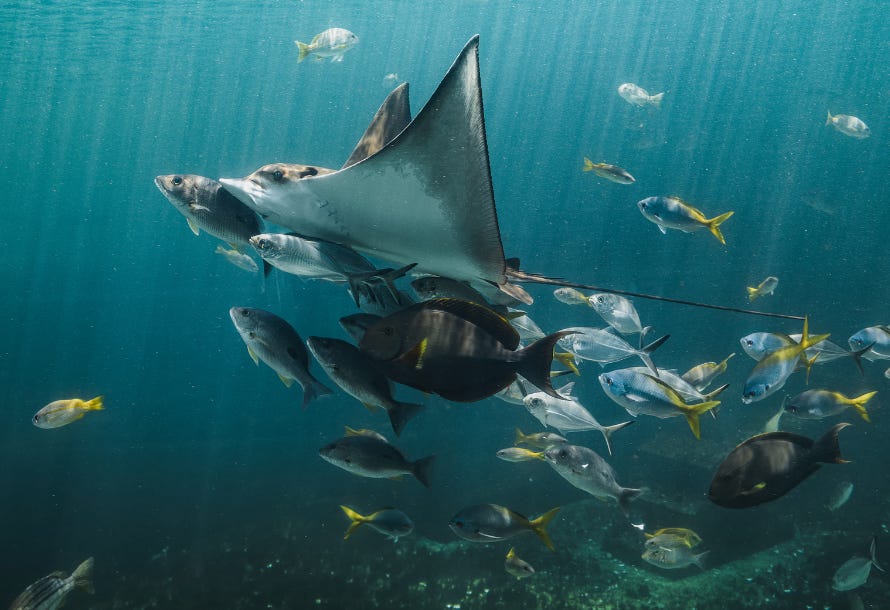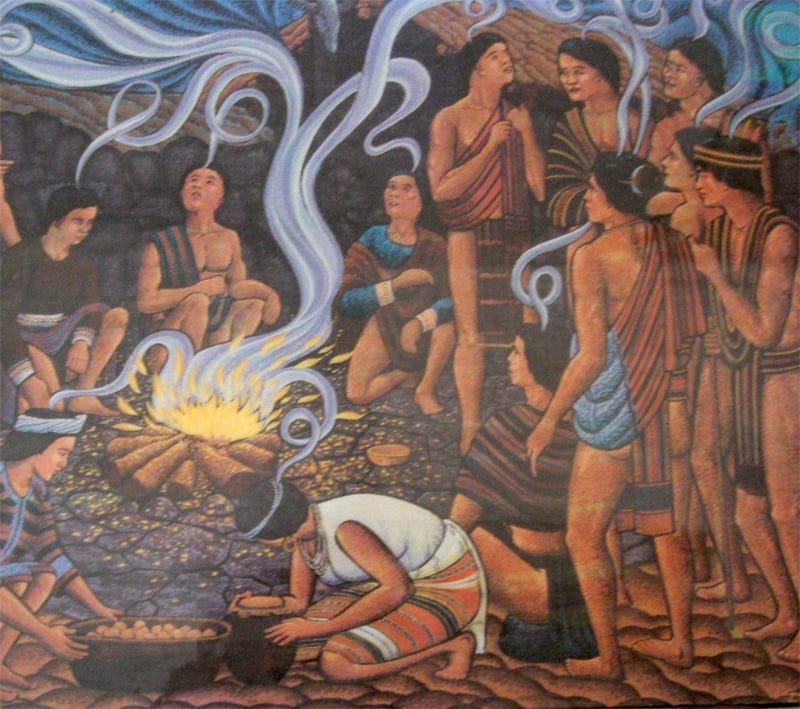Sustaining What Sustains Us
World Oceans Day and Saharan Sand
It’s World Oceans Day across our planet today. There won’t be many sermons about that here in the Carolinas, I fear. However, I am hopeful that a young person somewhere in our two states will be inspired today to think about our oceans from its amazing creatures to the quizzical nature of the ever present tidal cycles to the circulation that helps regulate our climate despite our worst intentions at control or extraction (whether with intent or not). Folly Beach is hosting a gathering if you’re in the Charleston area or the Lowcountry of SC.
Today is also Pentecost for those of us in the Christian traditions of the West. It’s a powerful moment for the early Church, and the book of Acts dramatizes the experience in great detail and importance.
The flame of Pentecost plays heavily in the hymns and artwork of ancient and modern art depicting the event. The image above depicts Pentecost from the islands of the Philippines (traditionally Panyupayana… and the islands were named for the Crown Prince of Spain, not the Apostle). I’ve always loved this piece and was glad to see it showing up in the suggested artwork from Vanderbilt’s Revised Common Lectionary this week.
Fire and Water. These are two manifestations of ancient beliefs about fundamental elements of the cosmos. Fire and water are also obviously important for ritual and performance in every religion. There’s a common human response to sitting around a fire with a group of other humans, just as there is a trance-like effect of sitting on the shore of a vast ocean and allowing our eyes to take a soft gaze towards the horizon, where we lose sight of the ground and perhaps our own egos.
Even the air and the dirt (the other two foundational elements) are playing a part in our local Carolina Ecologies this weekend as we observe large plumes of dust and sand from the Sahara Desert of Africa making the trip across our oceans to blanket the atmosphere of the Carolinas.
We often turn our hopes and troubles into metaphorical pleadings or statements, whether through water, fire, air or dirt. The biblical witness is full of humans struggling with others and especially with God to understand as well as share with others the importance of understanding our own ecologies, even with poetic turns to ecological metaphors:
Thus says the Lord:
Cursed are those who trust in mere mortals
and make mere flesh their strength,
whose hearts turn away from the Lord.
They shall be like a shrub in the desert,
and shall not see when relief comes.
They shall live in the parched places of the wilderness,
in an uninhabited salt land.
Blessed are those who trust in the Lord,
whose trust is the Lord.
They shall be like a tree planted by water,
sending out its roots by the stream.
It shall not fear when heat comes,
and its leaves shall stay green;
in the year of drought it is not anxious,
and it does not cease to bear fruit.
The heart is devious above all else;
it is perverse—
who can understand it?
I the Lord test the mind
and search the heart,
to give to all according to their ways,
according to the fruit of their doings.
Like the partridge hatching what it did not lay,
so are all who amass wealth unjustly;
in mid-life it will leave them,
and at their end they will prove to be fools.
O glorious throne, exalted from the beginning,
shrine of our sanctuary!
O hope of Israel! O Lord!
All who forsake you shall be put to shame;
those who turn away from you shall be recorded in the underworld,
for they have forsaken the fountain of living water, the Lord.
Heal me, O Lord, and I shall be healed;
save me, and I shall be saved;
for you are my praise.
Jeremiah 17.5-12, NRSV
Sustaining our oceans is beyond human capabilities, even in our present moment of presumed technological superiority over “nature.” We can’t fix warming trends, species extinctions, sound pollution harming our whale and dolphin cousins, over-fishing harming ecosystems at all levels, pollution runoff causing dead spots at the mouths of rivers that were once teeming with life and potential, or coral bleaching. Or could we?
We can observe the dust from a desert half a world away being deposited in our area, carried with the rushing wind of “trade winds” and global cyclical patterns. We can’t fix the amount of carbon dioxide we endlessly release into the atmosphere to power our modern way of life. We can’t clean up the pollution that still makes breathing our atmosphere harmful in so many urban areas worldwide. Or could we? What about our soils and the desertification we see in places such as Sudan where hunger has never left but continues to take the lives of too many children and people amdist the human destruction of war and famine.
We see metaphorical fires burning and animating us as we talk about Pentecost. But we can’t control the wildfires that sweep in with mighty rushing winds all across North America each summer (and have already started mightily in places like the Western Canadian provinces). Or could we?
Could we listen and act? Could we help to sustain those things that sustain us? Earth, Fire, Air, and Water. These aren’t just alchemical or mythological ideas that we can dismiss as fundamental building blocks of our human sustenance. We can, in some small way, each think, act, and do some thing (any thing) to tilt the scales a bit.
Change begins locally. Just a few dozen followers of Jesus gathered weeks after his death and resurrection to share what little they had with each other, and they experienced a transformation that is still rippling throughout our cosmos today. That started with just 12 followers. In my estimation and experience, God rarely sides with the majority. Today is the day that the Lord has made, so let us rejoice and be glad in it… and do some thing to sustain what sustains us.
"Embracing positive news isn't just a luxury; it's a conscious investment in our well-being. Hope is being able to see that there is light despite all of the darkness. In a world filled with challenges, it's essential to read uplifting stories that reshape our mindset and empower us to build a brighter future."
Desmond Tutu




